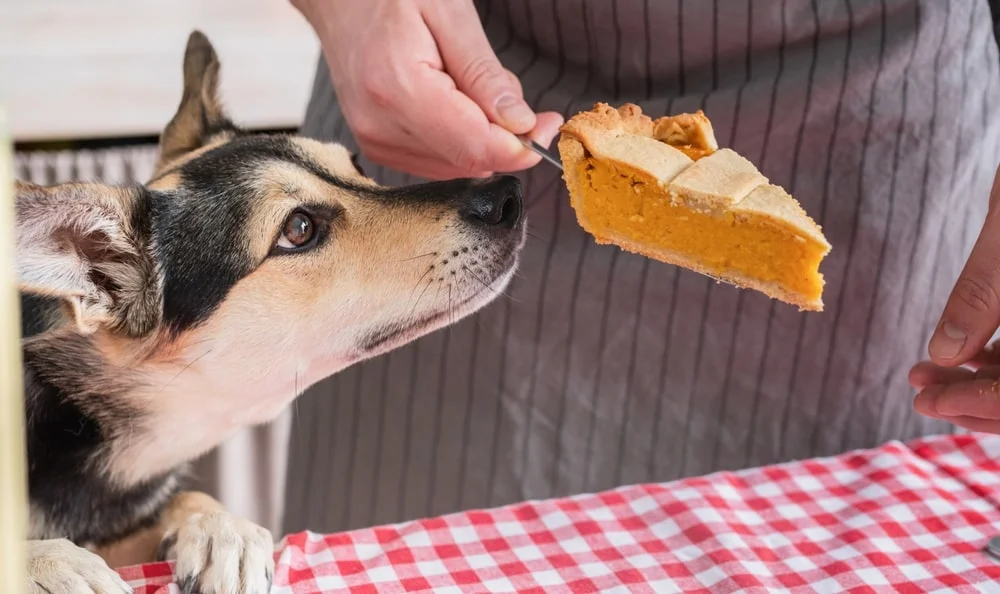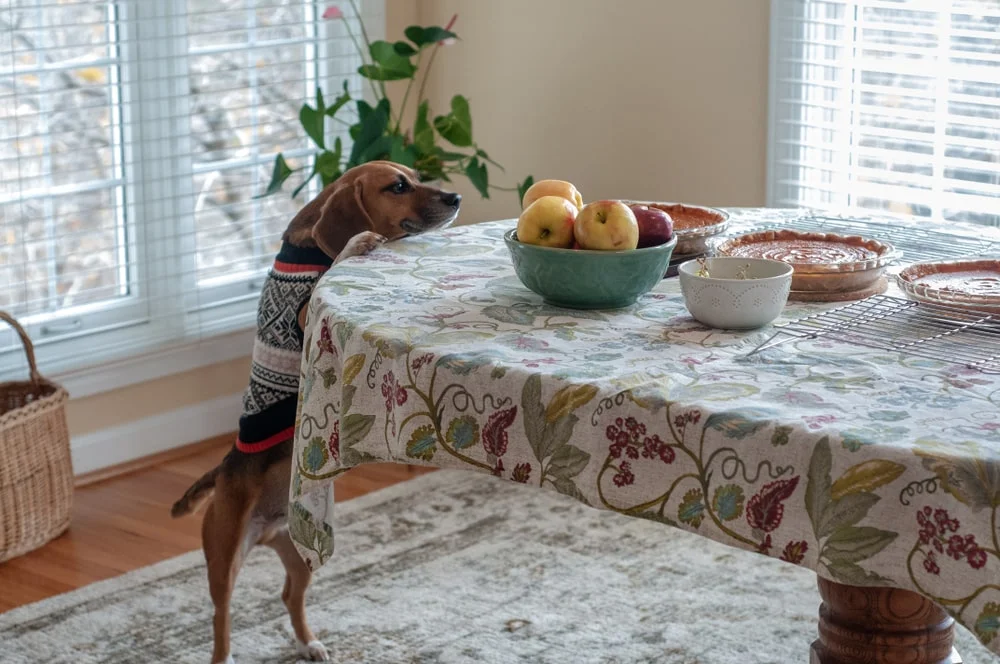PET HEALTH
Autumn brings the comforting aroma of pumpkin and apple pies wafting through your kitchen, tempting your taste buds and any furry companions you may have. With the holiday season right around the corner, dog owners may wonder if dogs can eat pumpkin pie or share a slice of peanut butter pie. What do you do if your dog snags a piece of pecan pie from the counter without your permission?
While many fruits have incredible health benefits for dogs, other ingredients in holiday pies could be toxic to them. Let’s explore what to do if your dog eats pie, signs of toxicity in dogs to watch out for, and some safe alternatives.
Which Type of Pie Did Your Dog Eat?
While the safest thing is to avoid letting your dog have any pie at all, if they snatch a few bites, they’ll likely be alright. Here’s what to do depending on what type of pie they ate:
- Pumpkin pie, apple pie, or pecan pie: Call your vet if your dog ate a large amount of pie; monitor them for symptoms if they only had a lick or few bites
- Peanut butter pie: Check to see if the peanut butter contains xylitol. If so, call your vet immediately. If not, monitor your dog for any symptoms.
- Chocolate cream pie: Call your vet immediately, especially if you have a small dog, as chocolate is toxic to dogs. Dry cocoa powder and unsweetened baking chocolate is also more toxic than milk chocolate or white chocolate.
- Key lime pie or lemon meringue pie: Monitor your dog for an upset stomach or dermatitis around their face and paws.
If you have a MetLife Pet Insurance policy, you may be able to use the MetLife Pet app to chat with a vet and ease your mind.
Whether you call your vet, contact an emergency vet or pet poison control, or use MetLife Pet’s online vet chat, tell them what kind of pie your dog ate, how much they ate, and describe any symptoms they may be having.
The vet you call will either advise you to bring your dog in as soon as possible or tell you to monitor them for any symptoms.
Are Expensive Vet Bills Giving You a Bellyache?
What Pie Ingredients Are Toxic to Dogs?
At MetLife Pet, we love our dogs and want them to be as happy and healthy as possible. That’s why feeding them pie is off the table. But life happens, and dogs can easily snag a piece.
While holiday pies may look and smell delicious, they’re loaded with potentially toxic ingredients for canines. Things like chocolate, nutmeg, and sweeteners are especially dangerous to dogs. Here’s a breakdown of some toxic ingredients in pies and how they can affect dogs:
Chocolate
Again, dogs can't eat chocolate because it’s toxic to them. It contains caffeine and theobromine, both of which can cause a caffeine overdose, fast or irregular heart rate, and nervous system problems.
Chocolate toxicity can take 6 – 12 hours to appear, so it’s important to keep tabs on your dog if you suspect they snatched some.
Artificial sweeteners
Artificial sweeteners can be worse for dogs than regular sugar.1 Xylitol is a common sugar substitute, also called birch sugar. This compound is highly toxic to dogs and can cause their blood sugar to drop to severely low levels. Xylitol can also cause acute liver failure. Both of these conditions can lead to death.
Call pet poison control if you even suspect your dog has ingested anything containing xylitol.
Sugar, butter, and oils
While sugar, butter, and oil aren’t toxic to dogs, they’re not good for them. If your dog eats a large amount or consumes them often, they can get an upset stomach, diabetes, or pancreatitis. These ingredients can also lead to canine obesity. It’s best to steer clear of sugar, butter, and oil when you’re feeding your dog.1,2,3
Lemon and lime
Lemons and limes are both toxic to dogs. The essential oils and psoralens in them can cause gastrointestinal problems if your dog ingests them or dermatitis if the juice gets on their skin. It’s best to avoid giving your dog both of these fruits.4,5
Nutmeg
Nutmeg has myristicin in it, a dangerous narcotic to dogs. This compound may cause your dog to have hallucinations, seizures, tremors, and high fevers. Large doses of myristicin can be fatal. It’s best to keep your dog away from anything that may contain nutmeg — and keep the jar tucked high up in a cupboard.6
Pecans
While pecans are technically OK for dogs to eat, they’re extremely prone to mold. If the nuts are moldy, they can be toxic. The mold that grows on pecans is a neurotoxin to dogs and may cause seizures or brain damage.7
Signs of Toxicity in Dogs
While the signs of poisoning in dogs vary depending on what kind of pie your dog ate, there are a few common symptoms to watch out for. When it comes to the ingredients in pie, generally, the symptoms you’re watching for are gastrointestinal or neurological. Here are some signs you may see in dogs who ate pie:8
- Upset stomach
- Vomiting
- Diarrhea
- Blood in stool
- Weakness or instability
- Seizures
- Tremors
Dog-Safe Pie Alternatives
Dogs can eat most fruits — like apples, pumpkin, bananas, mango, and pears. Just don’t give them the cores or seeds, as those can be toxic. So slice up the fruit of your choice and give your pup a bowl. Another popular doggie desert is the pup-cup, or you can buy specialty dog ice cream to serve them.
If you’re feeling fancy, you could even make a dog-safe pie with no sweetener or added ingredients, just apple or pumpkin purée. Maybe you add a dollop of plain yogurt on top for the “whipped cream.” This way, you can serve your pup a hearty slice for dessert with the rest of the family.
Pet Insurance: The Holiday Protection Your Dog Needs
Rather than pie, treat your dog to some pumpkin purée or chopped apples this season. It’s the best way to keep your furry companion safe and healthy, while still including them in the festivities. But if your dog eats pie or any of the toxic ingredients listed above, be sure to give your vet a call ASAP. Pet insurance can be particularly helpful for pet parents concerned about dog mischief.
Take Roni, for example. She’s a medium-size dog who got into the chocolate stash while her owners were baking. She scarfed down a bunch of chocolates and quickly began to exhibit symptoms of chocolate toxicity. The vet exam and treatment cost around $500. Thankfully, Roni’s parents had a MetLife Pet Insurance policy, which covered the entire thing. It’s situations like this where pet insurance can be worth it.9
If your dog steals a piece of pie, chances are you’ve got a vet bill right around the corner. Don’t wait for disaster to strike this holiday season, get a free quote for dog insurance today.
Help Your Pet Feel Better
855-270-7387



